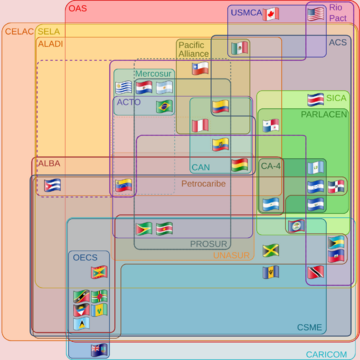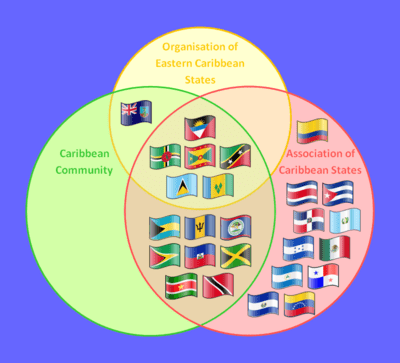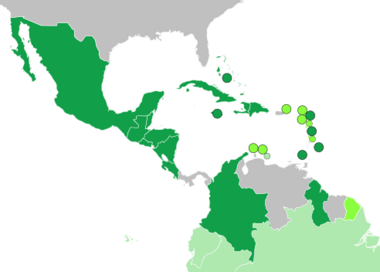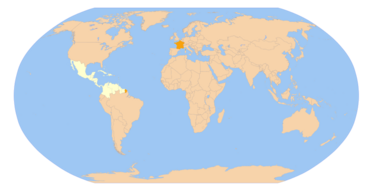Association of Caribbean States facts for kids
Quick facts for kids
Association of Caribbean States (ACS)
|
|
|---|---|
|
Flag
|
|
|
Map showing the member countries of the ACS.
|
|
| Seat of Secretariat | |
| Type | Regional organization |
| Membership |
|
| Leaders | |
| Rodolfo Sabonge | |
|
• Ministerial Council Chair
|
|
| Establishment | |
|
Website
http://www.acs-aec.org/ |
|
The Association of Caribbean States (ACS) is a group of countries in and around the Caribbean Basin. It was created to help these countries talk to each other, work together, and take action on common goals. The group was officially formed on July 24, 1994, in Cartagena, Colombia.
The ACS has five main goals:
- Increase trade between the member countries.
- Improve transportation in the region.
- Develop sustainable tourism (tourism that is good for the environment and local communities).
- Help the region respond better to natural disasters like hurricanes.
- Protect and conserve the Caribbean Sea.
The association has 25 member countries and several associate members and observers who also participate.
Contents
What Does the ACS Do?

The Association of Caribbean States was created to encourage countries in the region to work together. This idea of countries in the same area cooperating is called regionalism. The main goals are to focus on what the Caribbean nations have in common and to remove old barriers from colonial times that kept them apart.
The ACS helps its members have a stronger voice in the world economy. It does this by working together on four main topics. Each topic has a Special Committee that meets to discuss issues and make plans.
- Trade: The Special Committee on Trade Development works to build a stronger economy for the whole Caribbean. They hold meetings to find new ways for countries to cooperate on business and trade.
- Transportation: The Special Committee on Transport works on agreements to make air travel between countries easier and safer. They also deal with issues like stopping illegal activities on flights.
- Sustainable Tourism: This committee promotes a type of tourism that protects the environment. The goal is to make tourism good for nature and also bring money to the Caribbean region.
- Natural Disasters: The Special Committee on Disaster Risk Reduction helps countries prepare for and respond to natural disasters. They work to make sure the region is organized and ready to handle emergencies.
Protecting the Caribbean Sea
A major project for the ACS is to have the Caribbean Sea recognized as a special zone that needs protection. The group is asking the United Nations (UN) to see the sea as a valuable natural treasure.
The ACS is also trying to get the UN to pass a resolution that would ban ships from carrying dangerous nuclear materials through the Caribbean Sea and the Panama Canal.
How Successful Is the ACS?
Experts have different opinions on how successful the ACS has been.
Some people think the ACS is successful. They point to its many projects, large number of members, and its good relationships with other international groups like the European Union.
Others are not so sure. They say that, unlike other groups such as CARICOM, the ACS didn't achieve enough in its early years to be seen as a major force for development. Some experts believe it might be hard for the ACS to become a powerful player on the world stage. They worry that it might struggle to compete with large trade groups like the North American Free Trade Agreement (NAFTA).
Summits: Meetings of Leaders
The most important meetings of the ACS are called summits. At these meetings, the leaders (like presidents or prime ministers) of all the member countries get together. Leaders from observer countries and other organizations also attend.
During a summit, the leaders review the ACS's goals and make new commitments. They discuss the biggest challenges facing the Caribbean and decide on plans to solve them together. At the end of each summit, they sign a document called a Declaration, which outlines their decisions and plans for action.
The ACS has held nine summits so far:
- I ACS Summit, Port of Spain, Trinidad and Tobago (1995)
- II ACS Summit, Santo Domingo, Dominican Republic (1999)
- III ACS Summit, Isla Margarita, Venezuela (2001)
- IV ACS Summit, Panama City, Panama (2005)
- V ACS Summit, Pétion-Ville, Haiti (2013)
- VI ACS Summit, Mérida, Mexico (2014)
- VII ACS Summit, Havana, Cuba (2016)
- VIII ACS Summit, Managua, Nicaragua (2019)
- IX ACS Summit, Antigua Guatemala, Guatemala (2023)
Membership
The ACS is made up of member states, associate members, and observers.
Member States
These are the 25 full members of the ACS.
Associate Member States
These are territories that participate in the ACS.
 Aruba
Aruba British Virgin Islands
British Virgin Islands Curaçao
Curaçao France on behalf of:
France on behalf of:
 Guadeloupe
Guadeloupe Martinique
Martinique Saint Martin
Saint Martin Netherlands on behalf of:
Netherlands on behalf of:
 Bonaire
Bonaire Saba
Saba Sint Eustatius
Sint Eustatius
 Sint Maarten
Sint Maarten
Observer States
These countries watch and sometimes take part in ACS activities.
Relationship with Other Groups

The ACS works with many other international organizations. These groups are called "Observer Organisations" and include:
- Caribbean Community (CARICOM)
- Caribbean Tourism Organization (CTO)
- Central American Integration System (SICA)
- Community of Latin American and Caribbean States
- European Union
- Latin American Economic System (SELA)
- United Nations Economic Commission for Latin America and the Caribbean (ECLAC)
- Organization of American States (OAS)
See also
- Economy of Latin America
- Central banks and currencies of the Caribbean
- Caribbean Development Bank
 | Lonnie Johnson |
 | Granville Woods |
 | Lewis Howard Latimer |
 | James West |




